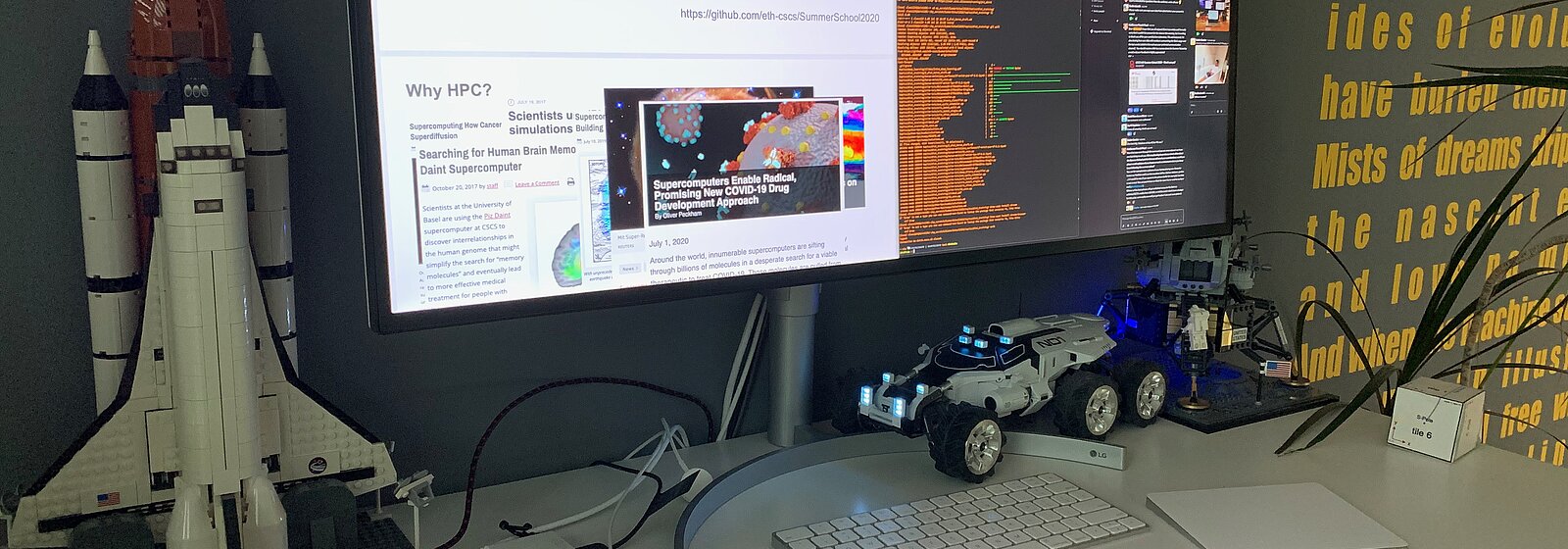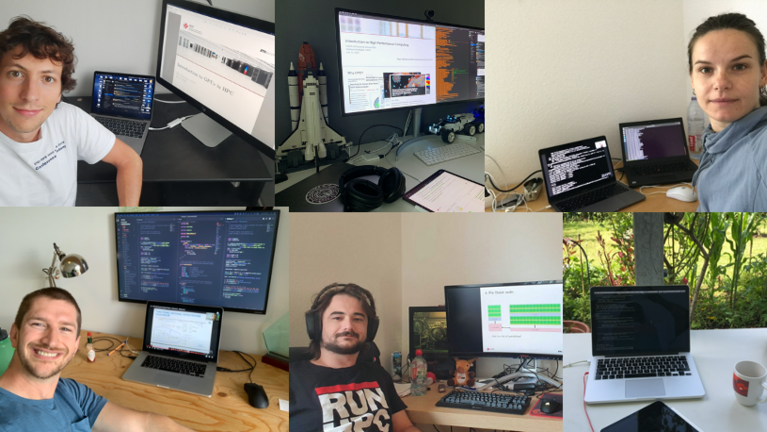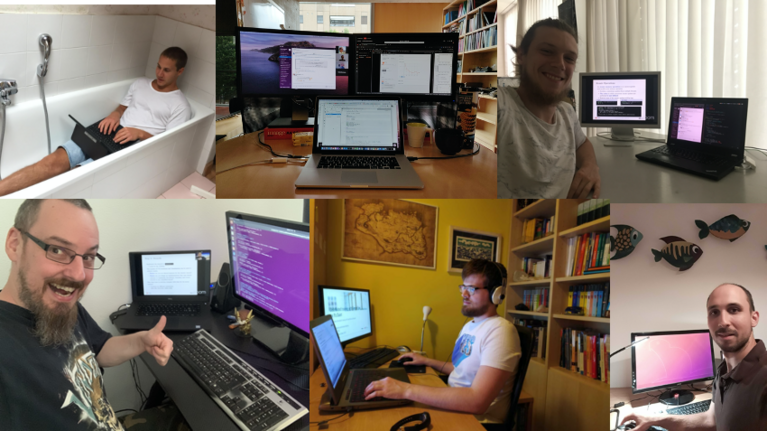September 24, 2020 - by Sarah Waldrip
Held from July 13–24, the CSCS-USI Summer School 2020 covered a range of topics including GPU architectures and programming, performance optimization and scientific libraries, interactive computing, Python HPC libraries, machine learning and GPU optimized frameworks, and deep learning on HPC platforms. After an introductory explanation of the GPU architecture available at CSCS, virtual lectures were provided each day by experts from CSCS as well as ETH Zurich, USI, and CSCS’s industry partner NVIDIA.
Interactive lab sessions were also held in conjunction with the lectures, during which students were granted remote access to the state-of-the-art supercomputing resources at CSCS so that they could gain hands-on experience applying the theoretical material they learned. Upon completion of the two-week course and lab work, attendees could participate in a live Q&A session as well as take an optional exam to earn six ECTS credit points for the course from USI.
Applicants admitted to the course ranged from third-year undergraduates to post-doctoral researchers who, regardless of their specific field of study, require HPC knowledge and skills to advance their work. Of the hundred students who attended, institutions from 14 European countries were represented as well as participants from Brazil, China, Japan, Mexico and the United States.
Adaptation to innovation
Knowing how crucial their program was for many aspiring scientists, the CSCS-USI Summer School organizers decided to adapt to the pandemic situation rather than cancel the event.
“Our main concern was that this is meant to be a very hands-on experience,” explains Guilherme Peretti-Pezzi, a group leader at CSCS who coordinated the event. “Students should be trying to code and solve problems during the lectures, but our teachers would not be able to stand by their shoulder and guide them in person this time. Thankfully, we found a good solution for this using a virtual chat platform that enabled them to ask questions in real time.”
While it was not the ideal circumstance, a surprising opportunity emerged amid the rush to reorganize: The necessary shift to an online learning platform made it possible to include more students than would otherwise have been feasible. “We realized that having virtual lectures would allow people from other time zones to participate,” Peretti-Pezzi says, “so we decided to expand the number of accepted applicants.”
In previous years, the CSCS Summer School accepted an average of 30 applicants for on-site attendance; but the 2020 virtual program allowed 50 students to interact directly with the lecturers and teaching assistants, while another 50 were permitted to watch the lectures at their own pace. There were also opportunities for attendees to interact in virtual “coffee breaks” that simulated the ability to move freely around the room and chat with each other, an experimental way to include some of the networking and socializing opportunities that would traditionally be a part of the event.
Filling in the gaps
Peretti-Pezzi has worked at CSCS since 2015 and, as a PhD student, he himself attended a summer school program in Lugano involving HPC that eventually led to him to apply for a job at CSCS. His experience made him a natural choice to take over a leadership role in planning the CSCS-USI Summer School two years ago.
“Our goal when putting together this program is to fill the gaps in the university programs,” he says. “We want to address the topics that are not covered by most courses and skills the students need to learn through practice. So, this Summer School is intended to help people doing scientific research in large-scale computing facilities with the common issues that they run into.”
Foundational knowledge of HPC architectures and systems remains the priority when designing the Summer School curriculum, but Peretti-Pezzi notes that students’ specific interests are included as well.
“Recently, we decided to also cover data analytics, which is a hot topic that is appearing in many areas of HPC,” he says. “This is something that our students might not necessarily need to be experts on, if they are scientists in a specific field, but they might also benefit from having knowledge in data analytics. The quantity of data is growing in many areas, exponentially, and knowing how to deal with this data is becoming an essential skill.”
The addition of data analytics to the curriculum in 2019 was a direct response to requests from applicants, according to Peretti-Pezzi, and the topic has remained popular among attendees. “The feedback we got from last year’s participants was really positive,” he explains, “so from last year to this year, we made only some minor changes to the curriculum and kept the data analytics as a focus for now.”
A valuable experience
Peretti-Pezzi emphasized how important student feedback is for the continued success of the Summer School, and he says he has received notably positive responses from this year’s participants despite the challenges of the pandemic.
“The school met my expectations fully,” says Milena Veneva, one of this year’s attendees. “The organizers did their best to simulate the in-person environment, and I think they did brilliantly.”
Veneva earned a master’s degree from Sofia University in Bulgaria, where she majored in computational mathematics and mathematical modelling. She is certified as a Model Master in Industrial Mathematics from the European Consortium for Industrial Mathematics, but she felt there was still a lot more to learn about HPC. “The best part was the Q&A sessions,” she added, “when I had the opportunity not only to ask questions on what we were taught throughout the day, but also about things related to my scientific research. The lecturers were not only good at what they do, but also ready to help.”
Marco Cilibrasi, currently a Ph.D. student at the Institute for Computational Science at the University of Zurich, already uses the “Piz Daint” supercomputer at CSCS for his research, but he says he attended the Summer School this year primarily to expand his knowledge of GPU programming.
“My main focus is simulating the formation and evolution of protoplanetary disks around young stars and studying the formation of planets around them. In doing so, I use HPC codes for numerical hydro-dynamics and gravitational N-body simulations,” Cilibrasi explained. “Most of the time I use existing HPC tools, but I applied to attend the Summer School in order to have a better understanding of these tools and to be able to write my own, as I am doing right now using for example GPUs or HPC Python libraries. Plus, even if I don't use these methods every day, Machine Learning and Deep Learning have some really interesting applications in my field.”
Although Veneva and Cilibrasi wished they could have interacted with others in the community face-to-face, they say the program met all their learning expectations and would recommend the program to other students and professionals interested in broadening their HPC skillset.


